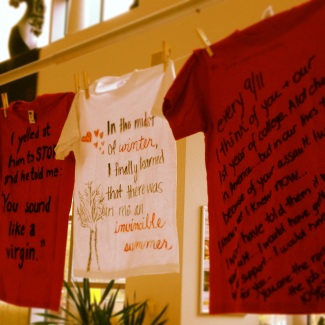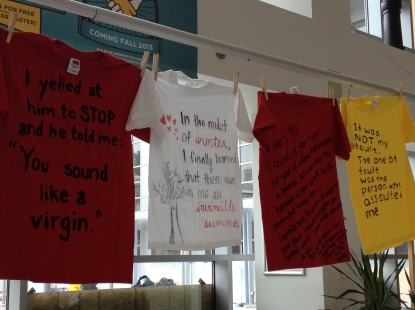The Clothesline Project display on Wednesday, October 3, 2018 from 10 AM- 4 pm in Commons Main Street.
The Clothesline Project is a program that started back in 1990 and has been established “to address the issue of violence against women. It is a vehicle for women affected by violence to express their emotions by decorating a shirt.” Here at UMBC we do this project twice a year – in October for Relationship Violence Awareness Month and in April for Sexual Assault Awareness Month. Survivors of sexual violence are welcome to decorate a shirt with their feelings and message. Then the shirts are anonymously hanged on a clothesline display, shoulder to shoulder in Commons Main Street “to be viewed by others as testimony to the problem of violence against [anyone].”
violence to express their emotions by decorating a shirt.” Here at UMBC we do this project twice a year – in October for Relationship Violence Awareness Month and in April for Sexual Assault Awareness Month. Survivors of sexual violence are welcome to decorate a shirt with their feelings and message. Then the shirts are anonymously hanged on a clothesline display, shoulder to shoulder in Commons Main Street “to be viewed by others as testimony to the problem of violence against [anyone].”
For the past three years that I have been part of UMBC community I have seen this project and its strong impact on the community. This is a great chance for anyone who has experienced violence to share their stories in a safe setting, and also practice self-care. Making these shirts is an act of therapy in its own way. Last semester for the first time, I made my own shirt. I shared my story with many people without putting my name out there. I was able to take a story out of my chest and feel so much lighter immediately.
As a student staff member at the Women’s Center and a Resident Assistant, I had the privilege of being involved with this project more closely. Last semester with the help of the Women’s Center and some of my Resident Assistant co-workers, we were able to hold another t-shirt-making event in the residential area. This event has happened before in the residential halls, but seeing the work in person was such a powerful experience. Seeing people coming in, making shirts, and sharing their stories shows how they trust us, which challenges us to provide the best support we can as Resident Assistants and Women’s Center community members.
I personally believe having this project on campus is a great opportunity for our UMBC community members to express their feelings about their experiences with sexual and gender-based violence.






